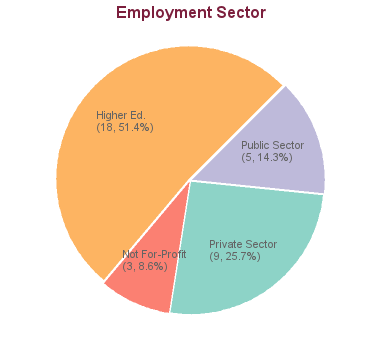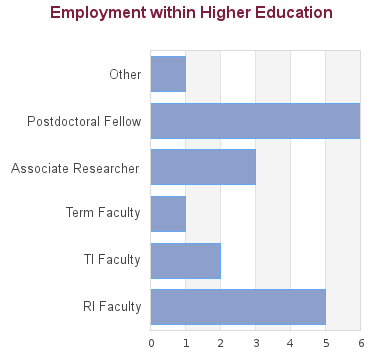
Perveen Biln
Job Title
Senior Specialist, Medical Affairs
Employer
Merck Canada

Review details about the recently announced changes to study and work permits that apply to master’s and doctoral degree students. Read more
The graduate program in Cell and Developmental Biology offers M.Sc. and Ph.D. degrees to students undertaking advanced study and research in cell and developmental biology. The program is flexible and is designed to accommodate the diverse backgrounds of students and the broad nature of research in cell and developmental biology.
The program's courses provide a thorough understanding of the scientific fundamentals and methodologies of contemporary cell and developmental biology. All students also undertake original and significant research from the start of their studies. With nearly 50 faculty members engaged in cutting-edge research in cell and developmental biology, a wide range of research topics is available to students.
The program also aims to enhance linkages and facilitate research interactions between the larger community of cell and developmental biologists in British Columbia by acting as a common forum for scholarly exchange in cell and developmental biology through its student-led seminar series, research retreats and other activities.
The Program is administered through the Life Sciences Institute (LSI), Canada's largest Institute for life science research which houses over 80 laboratories conducting internationally recognized research in areas such as cell and molecular biology, cancer biology, diabetes and microbiology & immunology.
Program faculty and students also conduct research at hospital-based research Institutes and Centres, including the BC Cancer Research Centre, the Biomedical Research Centre, the Centre for Brain Health, BC Children's Hospital Research Institute, the Centre for Molecular Medicine and Therapeutics,and the Centre for Macular Research. All of these Institutes and Centres offer highly collaborative research environments and provide outstanding facilities and resources to the ~ 70 graduate students who call the program home.
Given the number of researchers associated with the program and their varied Departmental and Faculty affiliations, the potential range of research topics available to students in the Program is very large.
Minimum level of financial support for M.Sc. and Ph.D. students of $25,000 per year, with top-ups for students who receive scholarships.
Acceptance into the Program is dependent upon a prospective student getting written agreement from a Faculty member that he/she will be their Research Supervisor.
The Faculty of Graduate and Postdoctoral Studies establishes the minimum admission requirements common to all applicants, usually a minimum overall average in the B+ range (76% at UBC). The graduate program that you are applying to may have additional requirements. Please review the specific requirements for applicants with credentials from institutions in:
Each program may set higher academic minimum requirements. Please review the program website carefully to understand the program requirements. Meeting the minimum requirements does not guarantee admission as it is a competitive process.
Applicants from a university outside Canada in which English is not the primary language of instruction must provide results of an English language proficiency examination as part of their application. Tests must have been taken within the last 24 months at the time of submission of your application.
Minimum requirements for the two most common English language proficiency tests to apply to this program are listed below:
Overall score requirement: 100
Reading
22
Writing
22
Speaking
22
Listening
22
Overall score requirement: 7.0
Reading
6.5
Writing
6.5
Speaking
6.5
Listening
6.5
Some programs require additional test scores such as the Graduate Record Examination (GRE) or the Graduate Management Test (GMAT). The requirements for this program are:
The GRE is not required.
Deadline to submit online application. No changes can be made to the application after submission.
Transcript DeadlineDeadline to upload scans of official transcripts through the applicant portal in support of a submitted application. Information for accessing the applicant portal will be provided after submitting an online application for admission.
Referee DeadlineDeadline for the referees identified in the application for admission to submit references. See Letters of Reference for more information.
All applicants have to submit transcripts from all past post-secondary study. Document submission requirements depend on whether your institution of study is within Canada or outside of Canada.
A minimum of two references are required for application to graduate programs at UBC. Each graduate program determines the type of reference (e.g. academic, professional) and number of references they require which can range from 2 to 4. References should be requested from individuals who are prepared to provide a report on your qualifications for the program.
Many programs require a statement of interest, sometimes called a "statement of intent", "description of research interests" or something similar.
Students in research-based programs usually require a faculty member to function as their thesis supervisor. Please follow the instructions provided by each program whether applicants should contact faculty members.
Permanent Residents of Canada must provide a clear photocopy of both sides of the Permanent Resident card.
All applicants must complete an online application form and pay the application fee to be considered for admission to UBC.
| Fees | Canadian Citizen / Permanent Resident / Refugee / Diplomat | International |
|---|---|---|
| Application Fee | $116.25 | $168.25 |
| Tuition * | ||
| Installments per year | 3 | 3 |
| Tuition per installment | $1,875.34 | $3,294.66 |
| Tuition per year (plus annual increase, usually 2%-5%) | $5,626.02 | $9,883.98 |
| Int. Tuition Award (ITA) per year (if eligible) | $3,200.00 (-) | |
| Other Fees and Costs | ||
| Student Fees (yearly) | $1,144.10 (approx.) | |
| Costs of living | Estimate your costs of living with our interactive tool in order to start developing a financial plan for your graduate studies. | |
Applicants to UBC have access to a variety of funding options, including merit-based (i.e. based on your academic performance) and need-based (i.e. based on your financial situation) opportunities.
Research Supervisors must commit to supporting you financially during the course of your training. The minimum level of financial support is $25,000 per year, for a minimum of 4 years. As a general rule, financial support continues to the completion of your degree, so long as performance is satisfactory and you remain in good academic standing. Students are expected to pay tuition from their stipend.
Financial support is in the form of a minimum funding package which can be made up from several sources – usually a combination of a Scholarship/Award, a Teaching Assistantship (from teaching duties as a graduate student, to a maximum of two 0.5 TAships per year) and a Research Assistantship (paid from a Supervisor’s research funds). There are no citizenship requirements for Teaching or Research Assistantships.
This results in a net balance (any funding provided to the student minus tuition and fees) mean of $34,492 and median of $34,345.
All applicants are encouraged to review the awards listing to identify potential opportunities to fund their graduate education. The database lists merit-based scholarships and awards and allows for filtering by various criteria, such as domestic vs. international or degree level.
Many professors are able to provide Research Assistantships (GRA) from their research grants to support full-time graduate students studying under their supervision. The duties constitute part of the student's graduate degree requirements. A Graduate Research Assistantship is considered a form of fellowship for a period of graduate study and is therefore not covered by a collective agreement. Stipends vary widely, and are dependent on the field of study and the type of research grant from which the assistantship is being funded.
Graduate programs may have Teaching Assistantships available for registered full-time graduate students. Full teaching assistantships involve 12 hours work per week in preparation, lecturing, or laboratory instruction although many graduate programs offer partial TA appointments at less than 12 hours per week. Teaching assistantship rates are set by collective bargaining between the University and the Teaching Assistants' Union.
Academic Assistantships are employment opportunities to perform work that is relevant to the university or to an individual faculty member, but not to support the student’s graduate research and thesis. Wages are considered regular earnings and when paid monthly, include vacation pay.
Canadian and US applicants may qualify for governmental loans to finance their studies. Please review eligibility and types of loans.
All students may be able to access private sector or bank loans.
Many foreign governments provide support to their citizens in pursuing education abroad. International applicants should check the various governmental resources in their home country, such as the Department of Education, for available scholarships.
The possibility to pursue work to supplement income may depend on the demands the program has on students. It should be carefully weighed if work leads to prolonged program durations or whether work placements can be meaningfully embedded into a program.
International students enrolled as full-time students with a valid study permit can work on campus for unlimited hours and work off-campus for no more than 24 hours a week during academic sessions.
A good starting point to explore student jobs is the UBC Work Learn program or a Co-Op placement.
Students with taxable income in Canada may be able to claim federal or provincial tax credits.
Canadian residents with RRSP accounts may be able to use the Lifelong Learning Plan (LLP) which allows students to withdraw amounts from their registered retirement savings plan (RRSPs) to finance full-time training or education for themselves or their partner.
Please review Filing taxes in Canada on the student services website for more information.
Applicants have access to the cost estimator to develop a financial plan that takes into account various income sources and expenses.
40 students graduated between 2005 and 2013: 1 graduate is seeking employment; for 4 we have no data (based on research conducted between Feb-May 2016). For the remaining 35 graduates:


Our graduates are well-prepared and highly competitive for the next step in their careers, whether in academia or in other sectors (e.g. biotechnology, health care, government, business, finance) where an in-depth knowledge of modern cell and developmental biology is required.
These statistics show data for the Doctor of Philosophy in Cell and Developmental Biology (PhD). Data are separated for each degree program combination. You may view data for other degree options in the respective program profile.
| 2023 | 2022 | 2021 | 2020 | 2019 | |
|---|---|---|---|---|---|
| New Enrolment | 5 | 1 | 4 | 3 | 7 |
| Total Enrolment | 51 | 46 | 40 | 40 | 32 |
Students in research-based programs usually require a faculty member to function as their thesis supervisor. Please follow the instructions provided by each program whether applicants should contact faculty members.
These videos contain some general advice from faculty across UBC on finding and reaching out to a supervisor. They are not program specific.
| Year | Citation |
|---|---|
| 2016 | Dr. Ng studied a cardiac ion channel responsible for pacemaking. He examined various molecules and mutations that influence how the channel works. This research provides insights on therapeutically controlling heart rate, especially in patients suffering from cardiac arrhythmia. |
| 2016 | Dr. Smendziuk studied stem cell regulation in the fruit fly testis. He identified the gap junction proteins that help the soma and germline communicate with each other during sperm development and characterized their roles in the stem cell niche. These studies assist us in understanding how stem cell behaviour is controlled in all animals. |
| 2016 | Dr. Tennant examined the role of a specific protein called Myt3 in the context of pancreas development and diabetes. His work identified this protein as a novel regulator of cell survival in the cells responsible for controlling blood glucose. His research points to Myt3 as a potential therapeutic target for improving the lives of diabetic patients. |
| 2016 | Dr. Garside examined the role of the transcription factor SOX9 during mouse embryonic heart valve development using a number of genomic approaches. Through her analyses of genome-wide datasets on embryonic valves, she discovered that SOX9 plays a key role in regulating a critical network of transcription factors essential for heart valve formation. |
| 2016 | Dr. Bround studied the role of the RYR2 protein in heart cells. He found that the same signals that cause heart contraction are also involved in maintaining heart rate and promoting energy production. His work provides both insights into how heart cells coordinate their activity as well as a greater understanding of heart health and disease. |
| 2016 | An important question in biology is how our genomes inform who we are and the diseases we get. Dr. Sanders developed new tools to visualize the organization and structure of DNA in a single cell. With this advance, she found the structural composition of human genomes is highly complex and unique. Now, we can test how these differences impact human health. |
| 2016 | Dr. Templeman examined the lifelong effects of lowering insulin in mice, a commonly used mammalian model organism. Her studies demonstrated that slightly reducing circulating insulin levels can lead to enhanced insulin sensitivity and improved metabolic health with aging, and is sufficient to extend mammalian lifespan. |
| 2015 | Dr. Biln studied how molecular barriers between cells are assembled and maintained. These barriers are essential to organism development. She identified novel roles for a critical protein in barrier organization and epithelial cell survival. This advances our knowledge of how cellular barriers are developed and provides insight into therapeutic targets. |
| 2015 | Dr. Berndt showed how the specialized functions of brain neurons are controlled by signals from targets that the neurons contact. He defined how these signals are interpreted at regulatory regions of DNA. His work contributes to our understanding of brain development, and describes processes that are disrupted in degenerative neurological diseases. |
| 2015 | Dr. Albrecht's research addressed the mechanisms behind the development of Diabetes. He showed that endosomes of the beta-cell can direct insulin signalling and contribute to the regulation of cellular calcium content. Understanding these processes helps to develop therapeutics directed towards the treatment of Diabetes. |
Cell and Developmental Biology courses provide a thorough understanding of the scientific fundamentals and methodologies of contemporary cell and developmental biology.
Departments/Programs may update graduate degree program details through the Faculty & Staff portal. To update contact details for application inquiries, please use this form.

From academic excellence and modern facilities to our diverse degree program listings to being named one of the “most innovative universities” by Reuters in 2019, UBC has a lot to offer.